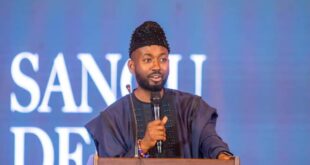Grassroots Sisterhood Foundation is a women-led organization working to enhance power relation in poor communities of Northern Ghana. Over a decade GSF has strived to ensure the voices of women are heard in various spaces be it on human rights, economic or social justice. In the process we have established various platforms including the Women Advocacy Platform (WAP) comprising women chiefs and community women leaders to address issues of concern in their communities; the Community Practitioners Platform to among others address issues of climate change. The Home-based Care Alliance was also created to demand recognition and compensation for women’s contributions to care giving particularly to persons living with HIV/AIDS and the Aged.
GSF has over a decade also worked to ensure the rights of women to land are respected focusing on access and secure customary land tenure, engaging communities and their traditional authorities and land administration agencies to address issues affecting women’s security of tenure. Our activities are aimed at changing land related discriminative practices and policies and tailored to enhance power relations through good land governance, inclusion in decision making and the setting in motion an agenda that will create spaces and increase women’s voices in land administration and finally build their ability to document and tell their own stories from exclusion to inclusion and from poverty to improved standards of living and enhanced security of land tenure.
Our efforts from the above culminated in the establishment of the Community Land Development Committee (CLDC) in nine communities of the Nanton Traditional Area.
Overview of women’s access to land in Ghana
Under the customary land administration system, women are often not consulted and therefore are not involved in taking decisions that have a bearing on land administration in their communities. Women and the vulnerable indeed face discrimination under formal and informal customary system of land tenure. The current system ignores their holding rights to land. This scenario excludes women from having control over land in spite of enacted legislation such as the 1992 Constitution of Ghana, the African Charter and other international conventions such as the CEDAW which provides for equal non-discriminatory rights to all citizens of resources and opportunities.
Aside from the social construct that relegates women to being part of a man’s property in most parts of the Northern Region, the socio-cultural policies and practices in land tenure security further aggravates the issues for women as it gives greater control and allodial rights only to male members of the family or communities thereby increasing women’s dependency and vulnerability. The traditional power relationships that portray male supremacy could be a potential contributor to female deprivation to land in spite of the fact that women account for 70% of production of subsistence crops and form about 90% of the labour force in the marketing of farm produce. Again, the co-existence of many systems of law regulating land in Ghana presents special difficulties, particularly for the more vulnerable sections of society, including women, the rural and urban poor.
In view of all the above and conscious of opportunities available to women under the Guidelines and Framework for Land Acquisition in Africa and the Africa Union Land Policy Initiative which Ghana has participated in developing and ratifying them towards achieving the SDGs and Agenda 2063, GSF saw a need to mobilize women particularly women farmers through the creation of a platform that will enable them take advantage of such opportunities and enhance their voices in land dialogues and ensuring they negotiate secure tenure to improve food and livelihood or income securities.
What then is the Community Land Development Committee?
CLDC is a novelty sustainability tool created to ensure women’s participation in all land related decision-making processes in the community and to maintain the synergies established among chiefs, women and the youth during project implementation from 2007 to 2012. The ultimate objective of the CLDCs is of ensuring fairness in land allocation for agricultural and other livelihood purposes and to ensure small scale farmers particularly women have enhanced security of land tenure. CLDCs are not a land allocation body neither are they the sole decision makers at the community level on land. The committees were meant to serve as a communication link and a governance tool between the chiefs and the community members to ensure accountability and transparency in land management and to ensure communities benefit from large scale land-based investment in the community as well as to ensure gender parity in the allocation of land to indigenes for residential and agricultural purposes. CLDCs were also a vehicle to get more women participating in community related land discussions as this was not the practice and their exclusion made them unaware of proposed sites for sale of lands for residential often resulting in women acquiring these lands from speculators who are also members of the community.
Women are largely excluded from land administration and governance in Ghana and in Dagbon, the youth and women are excluded from land related discussion. They are only recipients of final results from any discussions around land management and administration. On the contrary, the livelihoods of these women and those most vulnerable are closely tied with land for agricultural purposes. All positions of leadership from the chief to the court jester are occupied by men, and since these positions are inherited only by male descendants of the royal families women do not stand any chance to occupying these positions at the community level or in the traditional area. There is only one position led by a woman and that is the community women’s leader or Magazia. Decisions are therefore taken by men at the chiefs meeting halls and women leaders are exempt from these spaces.
To enable the above group’s (women and the youth) participation and representation in land related discussions, the leadership of GSF, its partners and the women groups in 2012 suggested the creation of a platform that will get women and the youth to take up roles in land management and to hold traditional authority accountable to their stewardship for GSF, it was an opportunity to include women and the youth in land related discussions at various levels of the community including the household.
Series of dialogues and meetings preceded the establishment of the CDLC in each community during which recommendations were made by community members on how to involve all categories of persons in land administration and management. Selection criteria for CLDC members were clearly spelt out by all project stakeholders, but the selection process itself was done exclusively by community members in order to ensure local ownership of the initiative. The CLDCs which are composed of representatives of the youth and women groups, opinion leaders and the chiefs have 30% female representation and the community women’s leader was recommended as an automatic member.
Achievements
Some of the committees such as in Wamale, Jerigu, Lahagu and Bagliga have relatively better understanding of issues of land rights and security of tenure for agricultural and even for residential purposes in the communities where the project was implemented. According to them with the support of the CLDC, some women in the communities were able to negotiate about five years of tenure of security for farmlands. However, tenure of security varied from one community to another and some communities managed to negotiate longer periods of tenure than others. Some women have also sought and accessed land for group farming outside their communities
The presence of the CLDC has reduced land grabbing as some people take advantage of the dual nature of chieftaincy to acquire huge plots of land to the detriment of the generality of the community claiming the paramount chief has permitted their acquisition.
Because of the inclusion of the community women leader in the committee, they enjoy relative participation in the land issues especially during large scale land acquisitions. At least this is a shift from total exclusion. The creation of CLDCs has brought several benefits to the beneficiary communities with several households having had increased produce as a result of women being targeted and given land for farming which has improved their living standards. The inclusion of women in decision making has tremendously improved both at the household and community levels encouraging more youth to want to be members of the committee.
Challenges
The CLDC is confronted with distrust and seen as a threat to traditional authority. This arises as influential people including politicians attempt to acquire large portions of community land to the detriment of the larger community. Traditional leaders and land owners are bending over to the influence of these land grabbers and the financial gains promised.
A Call To Action: To The traditional Authority
Traditional authority should zealously guard the land and hold it in trust for those who fought for the sovereignty of the land, for those living who have various needs and interests in the use of the land and finally for the future generation to also benefit from the use of the land.
Chiefs should ensure that the economic values of the land benefits all and that land being the most readily available resource will meet the livelihood benefits of the youth who have interests in agriculture both in crop and animal farming to reduce poverty levels among the youth.
Chiefs should also strive to engage with various groups at the community level particularly women regarding large scale land investments as they are gatherers of economic fruits such as shea nuts, dawadawa, silk cotton, baobab nuts, seeds, leaves for consumption and other medicinal purposes. This will promote transparency and accountability to be emulated by all members of the community. They should show leadership by example.
We call on chiefs to modify culture and eliminate negative practices that are detrimental to the progress of women and the girl child as well as embark on reforms at community level through to the national level and work towards allowing the land laws to protect women’s access and secure land tenure to ensure food and income securities.
We appeal for full support for the activities of the CLDC to ensure fairness in the dealings on land and to also ensure the voice of women are heard within the traditional setting on land related matters.
We call for expanded political positions at the traditional level in respect of women as a means of encouraging a change in perception about the place of women in national development.
We call on traditional authority to do more land rentals for economic purposes than outright sales to ensure sustainable ownership of the land by the communities.
Finally, we share the vision of chiefs who lead their communities to embrace gender equality and promote practices that reduce poverty and dependence of women aid as well as maintain their roles and status as agents of change and development.
We urge the Regional House of Chiefs to adopt the CLDC to enhance women participation in land governance. Similarly, there should be intensified land policy education on land laws and how these laws benefit women and the entire community members.
To Women and rural women farmers
We encourage them to take advantage of available opportunities in various frameworks for reducing poverty and improving gender equality, to assert themselves in issues pertaining to land access, control and management.
Take leadership and engage with local and traditional authority to enable the tabling of issues of concern to women and the vulnerable particularly in the areas of land access and secure tenure to increase their incomes and food security as well as,
To strive to lead efforts at ensuring change both at local and national level and make visible their contribution to community and national development.
To the Youth
We urge the youth to take active roles in land discussions as they represent the future of the land and to aspire to leadership through quality education and knowledge of customary land laws so as to adequately make choice and valuable decisions for the communities they represent and society at large.
As leaders of the future, we require the youth to set the pace for gender sensitive policies to ensure change and advancement in the socio-economic and political spheres to improve quality of life and increase participation of women in decision making.
To Members of Parliament;
We demand that Members of Parliament engage with their constituents to understand the issues confronting women and the youth particularly the rural women farmers, collate their views on the current land bill before the house and consequently look at and pass the bill with gender considerations as presented by gender activists and well-meaning members of the society.
And finally to the Land Agencies;
We call for more educational programmes on the land reforms to sensitize potential land users of the changing trends related to land acquisition and security of land tenure to enhance women participation in land governance.
We demand they make land registration affordable to the citizenry as the cost of registration of farmlands is very high as its registration is treated in similar way as residential plots. Therefore, the land sector agencies should create new procedures which make it easier and cost saving to register farmlands. This has tendency to leverage resources to invest in the land and general farming activities.
We call for punitive measures for individuals and corporate bodies that misappropriate land and grab lands to the despair of the generality of a community.
By Fati Alhassan, Executive Director, GSF, Ghana and Members of the CLDC.
 Savannah News Online Reporting Only What Matters Most
Savannah News Online Reporting Only What Matters Most



